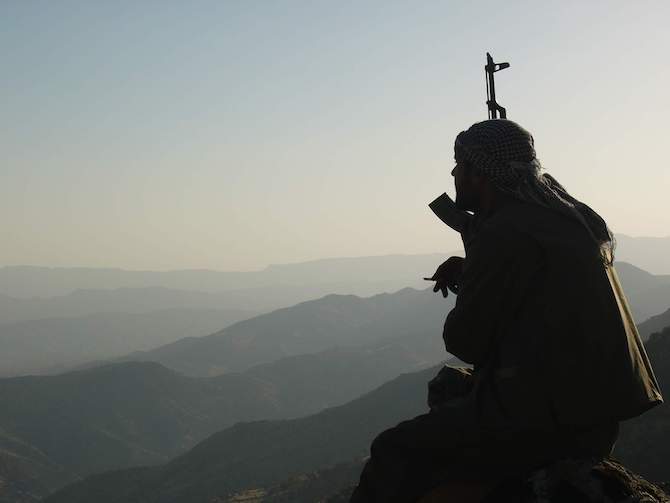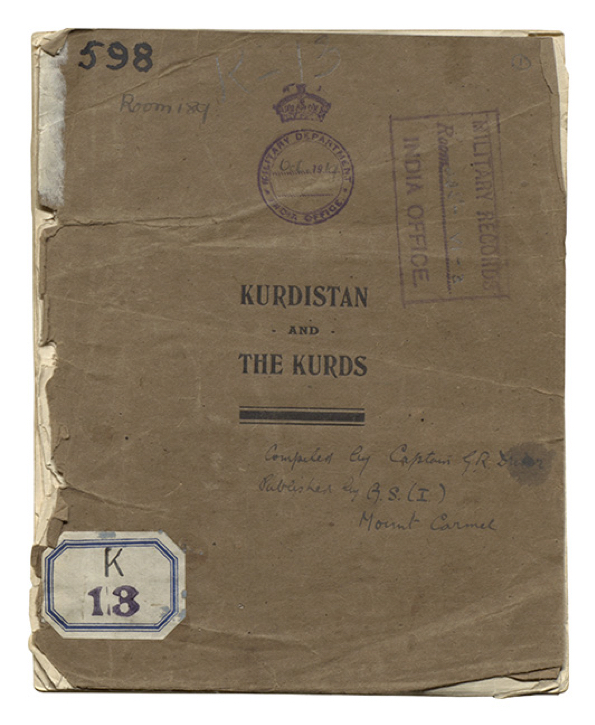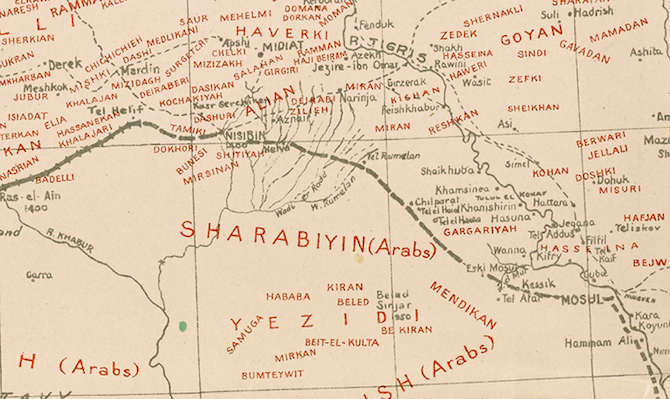by Francis Owtram

The Kurds remain a people without their own independent state, and in their recent abandonment by President Trump have again experienced the particular vulnerabilities of stateless peoples in a world of nation-states. Following the collapse of the Ottoman Empire at the end of the First World War, the lands inhabited by the Kurds were divided between three successor states: Iraq, Syria, and Turkey. The Kurds thus became concentrated minorities within new centralised states which, in practice, almost exclusively followed policies aimed at suppressing Kurdish identity, crude attempts at assimilation, and military repression throughout the twentieth century. Pressured and at times outright attacked by these regimes, the Kurds often only found sanctuary in the rugged peaks and ravines of the Zagros mountain range, providing the basis for the popular Kurdish aphorism: ‘no friends but the mountains.’
This ongoing and contemporary state of affairs arguably has its origins in the prevailing attitudes of British officials towards the Kurds during and immediately after the First World War. Despite the official end of hostilities between Britain and Turkey on 30 October 1918 with the signing of the Armistice of Mudros, for strategic reasons British troops kept marching on until Mosul was occupied on 10 November 1918. Britain consequently occupied the entire Mosul vilayet where there was a high concentration of Kurds. During this initial occupation it seemed that the Kurds were poised to obtain at least an autonomous homeland, as anticipated in the Treaty of Sèvres (10 August 1920).
The British Creation of Iraq
At the San Remo conference in 1920, Britain had been awarded the League of Nations Mandate for Mesopotamia, which subsequently became the Kingdom of Iraq following the signing of the Anglo-Iraqi Treaty on 10 October 1922. The extent of contemporary British awareness of the Kurdish people and their lands is to be found in a report published by the General Staff, India in 1919, which brought together available British knowledge on ‘Kurdistan and the Kurds’.

The report drew on a paper written by Sir Mark Sykes on ‘The Kurdish Tribes of the Ottoman Empire’ in 1908. Sykes’ influence over the formation of the modern Middle East would turn out to be extraordinary and long-lasting, owing to his part in drawing the infamous Sykes-Picot borders on a map of the region, enclosed within the Asia Minor Agreement signed between Britain and France on 16 May 1916. The agreement ushered in the Sykes-Picot era, dividing the Middle East with ‘a line from the “e” in Acre to the last “k” in Kirkuk’, and envisaging a British-controlled state that later became known as Iraq.
The 1919 report also drew on accounts of expeditions by military and political officers in ‘Kurdistan’ whose reports were ‘at present incomplete as the country has only been accessible to British officers for six months’. Accompanying this culmination of extant imperial knowledge was the map ‘Kurdistan and the Kurdish Tribes’, about which the General Staff opined: ‘The map can only be regarded as approximately correct. It is impossible to locate exactly nomad and semi-nomad tribes, or to define boundaries where group overlaps group.’ The report also indicated the extent to which British officials viewed the Kurds with suspicion, perceiving an inherent antipathy towards Britain’s efforts in building new states such as Iraq. Despite these British reservations, Oriental Secretary Gertrude Bell convinced T E Lawrence and Winston Churchill, then Secretary of State for the Colonies, to include the Kurds in the state of Iraq to ensure that its monarch, Faisal I, would rule over a predominantly Sunni – rather than overwhelmingly Shi’a – population. It was this view which would win out – with longstanding consequences for the Kurds – over the perspective of Major Edward Noel, the Political Officer in Sulaimaniyah, who favoured an independent state or autonomy for the Kurds (See ‘Major Noel’s Diary on Special Duty in Diarbekir Vilayat’).

Iraq, Turkey and the Mosul Question
Furthermore, the creation and then development of the state of Iraq by the British – as a means to control the vast reserves of oil considered likely to be found there – also militated against a favourable attitude towards the development of separate areas of autonomy for the Kurds. Similarly, the Turkish resurgence under Atatürk meant that the idea of a homeland or autonomous area for the Kurds did not feature in the Treaty of Lausanne (24 July 1923).
Indeed, the thorny question of the Mosul vilayet and international borders was only resolved in 1926 in the Treaty of Ankara when Turkey agreed for Mosul to be part of Iraq, in payment for revenues from oil for a period of twenty-five years. Turkey simply denied the Kurds in its territory any sense of Kurdish identity, prohibiting the use of the Kurdish language and labelling them ‘Mountain Turks’.

Tragedy, hope and abandonment
Since the end of the First World War, therefore, the story of the Kurds in the Middle East has been marked by state repression, denial of identity, attempted cultural assimilation, and finally attacks with weapons of mass destruction. As first War and Air, then Colonial Secretary, Winston Churchill advocated chemical weapons allied to air power as a potentially useful tool in the frontier regions of India and the Middle East where tribes such as the Kurds were hostile to British imperial control. Churchill’s imperial contemplation in some way was a prelude to the genocidal actions of Iraqi President Saddam Hussein’s actual deployment of chemical weapons to deadly effect against the Kurds at Halabja in 1988. Saddam’s broadly assimilationist approach had before included attempts to militarily pacify Kurdistan in the 1970s, and his antipathy towards the rebellious Kurds continued until the overthrow of his regime by the US military invasion of 2003. Subsequent rulers have dealt with problem of holding Iraq together as a federal state. Moves towards a new form of democracy in Iraq were followed by the creation of the autonomous region of Rojava in Syria, carved out in the midst of the uprising in 2011 against President Bashar al-Assad and the fight against the Islamic State. The Kurds in Syria found themselves surprisingly backed (as with the 1991 Iraqi no-fly zones) by an international coalition led by the US. In Syria, new forms of autonomous democratic development in the Kurdish region seemed to be tantalisingly close to consolidation only to evaporate in a personal transactional deal between Presidents Trump and Erdogan.
‘No friends but the mountains’ … again
Given their history of repression since the First World War it is hardly surprising that the Kurds have been at the forefront of new federal experiments for autonomy in the Middle East, or indeed moves towards independence. Following unresolved constitutional issues with the central government in Baghdad the Kurdistan Regional Government (KRG) decided to hold, nearly a century after the Sykes-Picot agreement, a referendum on independence in September 2017. This resulted in an emphatic expression of preference for independence (approximately 93 percent), perhaps regardless of the voters’ perceptions of the motivations behind holding the referendum (some Kurdish factions saw it as a ploy by the then KRG President, Masoud Barzani, to distract from domestic failures and questions of good governance). After many years, the Kurds in Iraq were able to participate in a process of self-determination, expressing their thoughts, feelings and aspirations on the possibility of independence and statehood. However, the international community, including the US, UK, UN and the EU, did not support the referendum as it was deemed to be a destabilising and unilaterally conceived measure against the wishes of the sovereign state (Iraq). Nor did the neighbouring states of Turkey and Iran, or indeed the central government in Baghdad, respond favourably to the vote, instead placing the Kurdistan Region under an immediate international air transport blockade followed by military incursions into the ‘Disputed Territories’ in which the divisions of the Kurds in Iraq were cruelly exposed. Kurdish attempts at self-determination continue but with the betrayal of the Kurds in Syria by President Trump and the ongoing repression of the Kurds in Turkey it would seem that the Kurdish refrain that they have ‘no friends but the mountains’ continues to ring true.







Sir, The above work is an example of extraordinary hard-work and dedication on research and it has helped me understand the concepts and events very well. Thank you so much. Looking forward to read more of such works.
We do appreciate each minute you spent of your valuable time to prepare this awesome essay. Thanks a lot !
“No friends but mountains!” Indeed is. Many thanks Francis Owtram. As I read your post and tears are dropping from my eyes for my land, I would say it would be rude to not mention your effort and thank you for your efforts by making this post about us Kurds. Thanks behalf of every Kurd from worldwide 🌿.